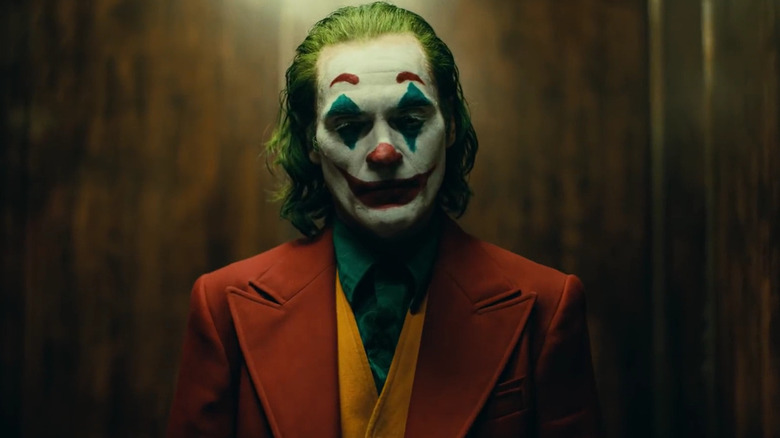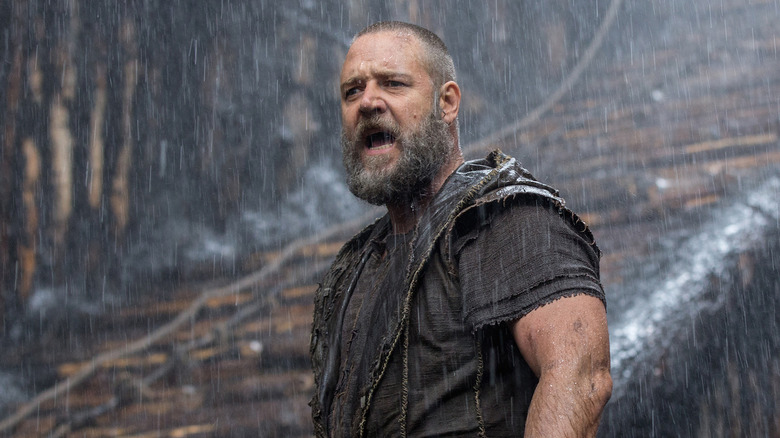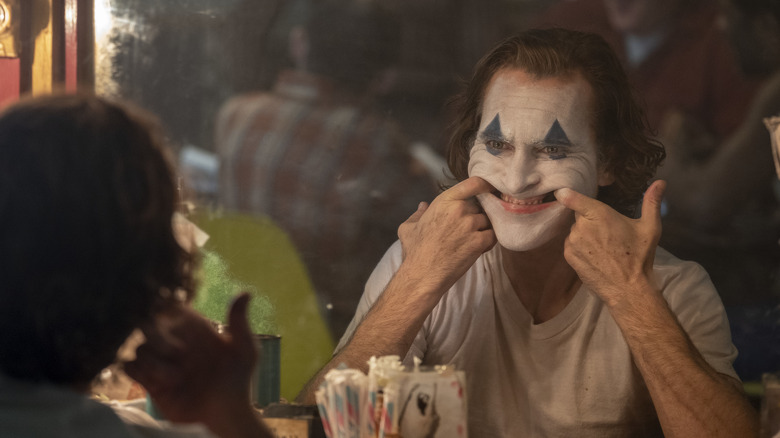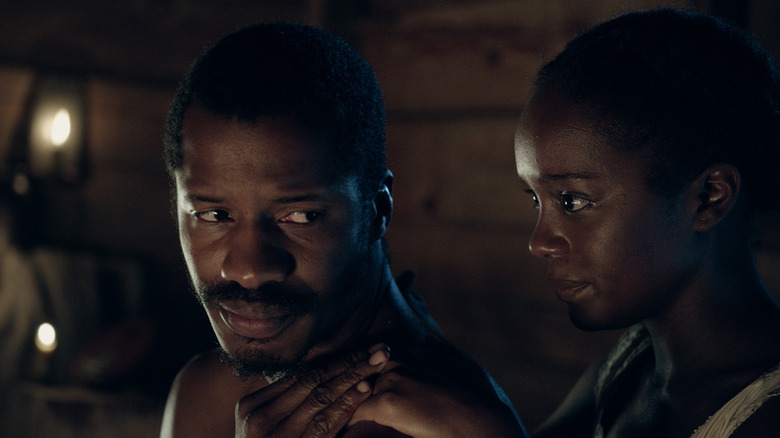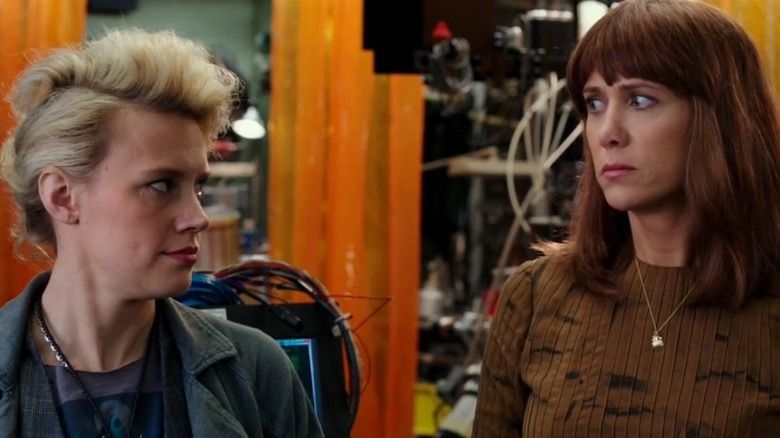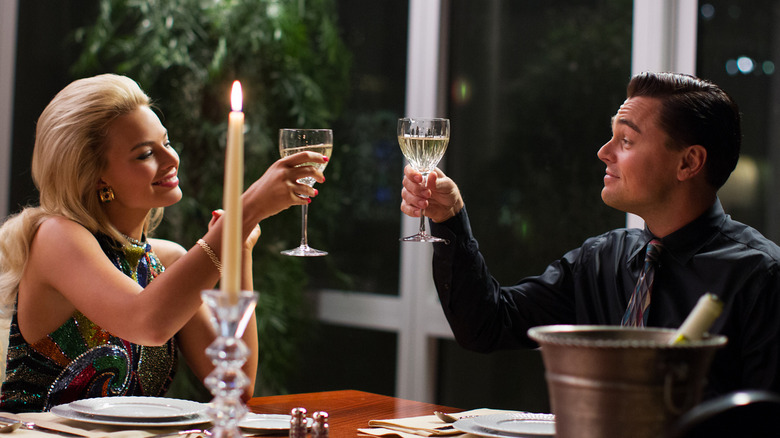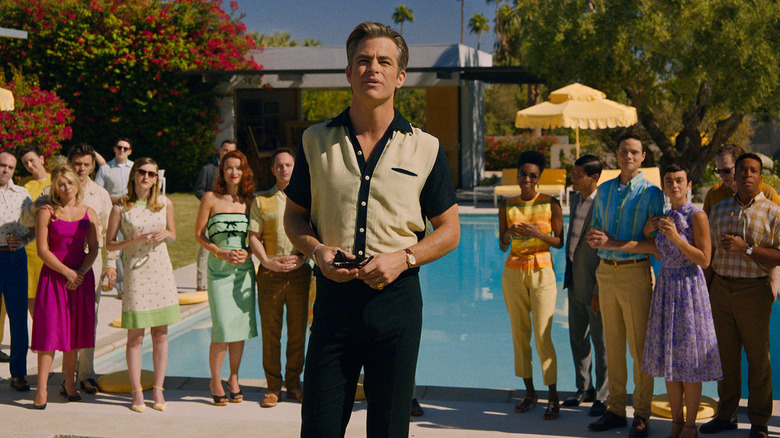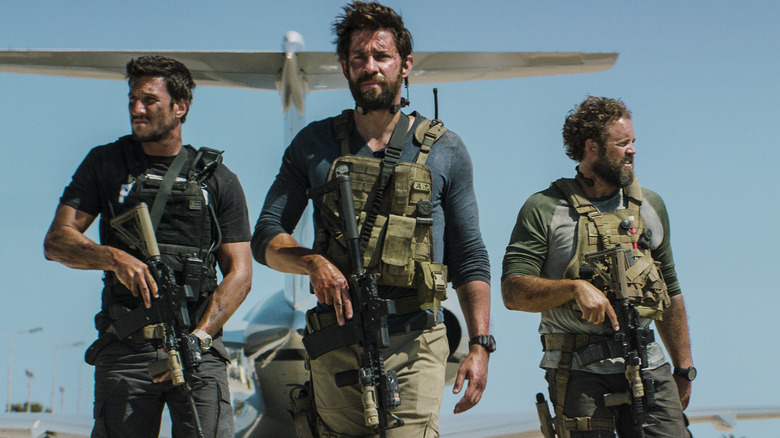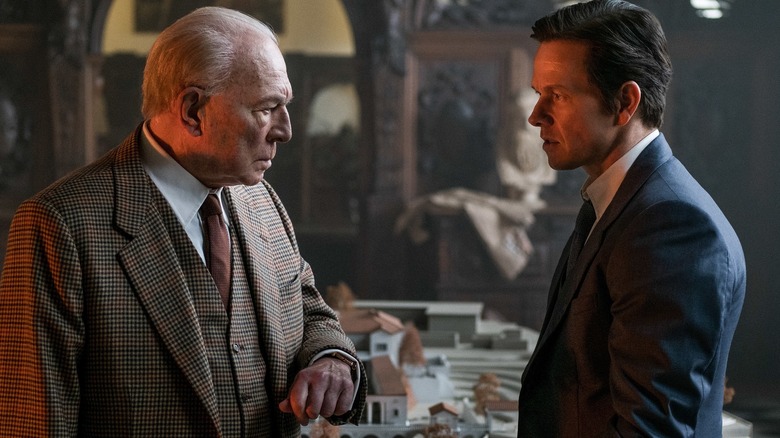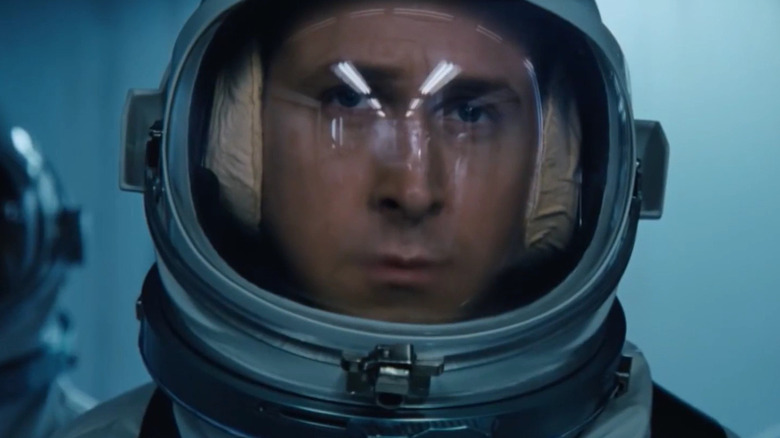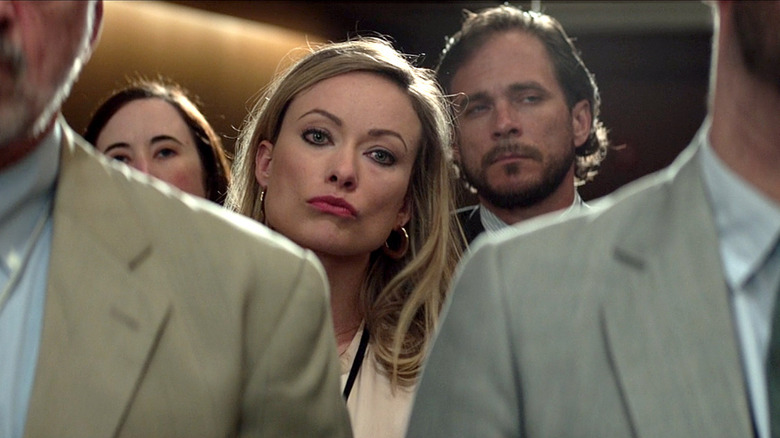The Biggest Box Office Controversies Of The Last Decade Explained
One of society's most beloved art forms is cinema. The primary goal of movies is typically to evoke emotion. Through this, a potential window to heated debate opens up. Many films have been released to heavy criticism from a segment of the audience, causing major controversies.
These controversies usually affect the film's box office returns: In most cases, they curtail the box office potential — but in rare circumstances, the buzz generated through the controversy ends up benefitting the film. Since filmmaking is expensive, the quest to avoid these controversies has gone on to shape the way fans receive movies to this day. For instance, when "Indiana Jones and the Temple of Doom" and "Gremlins" were released, the MPAA devised the then-new PG-13 rating system because of all the controversy caused by the grisly scenes in these movies intended for the entire family.
Whether recontextualizing religious texts to address contemporary concerns, spreading social media rumors, or even removing an actor's performance from a film, box office controversies have become more of a product of their period in recent years. And since nowadays fans are frequently intrigued as to why certain films are no longer made or why some stars simply disappear. With each new controversy, fans can gain insight into the whys and hows of the industry they admire. So let's take a deep dive into the major box office controversies from the last decade.
Noah
"Noah" is a 2014 Biblical epic movie directed by Darren Aronofsky. In the Bible, the story of Noah runs for just 5 chapters and Noah doesn't say a word — but a film that ran more than 2 hours needed more information than that. In interviews, Aronofsky said he was planning on exercising his storytelling liberties by mostly focusing on the implied flaws of Noah from the Bible.
Despite the movie's occasionally bizarre elements, it was still praised by most for exploring themes of environmentalism and religious fundamentalism. However, near the end of the film, the story departs from the biblical story and has Noah threaten to kill his daughter-in-law's child if it is a girl, partly because he believes that's what God wants and partly because he believes that humans must be reduced for them to stop corrupting the world.
Needless to say, that ending rubbed religious groups like the Catholic church the wrong way. A deacon rebuked the movie, saying the ending "undercut the moral ground of the entire account of Noah." Additionally, the depiction of Noah also contravened Islamic law and the movie ended up being banned in several nations in northern Africa and the Middle East. Luckily, the stars and studios defended themselves well from the criticism and the film ended up being a financial success regardless.
Joker
"Joker" was a major breakthrough for the DCU, providing a unique experiment with one of the company's most beloved characters. "Joker" provides an origin story of the legendary "Batman" villain set in the 1980s, taking inspiration from Martin Scorsese movies of the era.
The film premiered at the Venice International Film Festival, where it received an 8-minute standing ovation and the festival's highest honor: the Golden Lion. However, as the reviews began to come in, critics expressed their distaste for the sympathetic portrayal of such a gratuitously violent man. Indiewire called the movie a "toxic rallying cry for self-pitying incels." On top of that, the US Army issued a warning to military personnel about the possibility of violence at theaters showing "Joker."
The studio then faced an uphill battle in marketing the movie that had garnered such a bad reputation even before it was released. The studio chose to double the production budget of $60 million for marketing purposes. Todd Phillips, the director, and Joaquin Phoenix were no pushovers either, walking out of interviews and criticizing their adversaries. That seemed to work — the film ended up winning even more accolades and grossing more than $1 billion at the box office.
The Great Wall
Every phase of the filmmaking process is critical and can make or break a film. Matt Damon learned this the hard way. "The Great Wall" is a trite summer movie about people defending themselves against monsters attempting to invade China. The film's formulaic nature dissatisfied critics, leading to an overwhelmingly negative response. However, even before the film was released, the teaser trailer sparked outrage with claims of whitewashing.
White actors playing non-white roles have a long and regrettable history in Hollywood, fans and critics alike have grown annoyed by Hollywood whitewashing. As a result, by the time only the teaser trailer was out, critics were already accusing the film of whitewashing. That wasn't the case in the actual film, as Matt Damon said in an IGN interview, "I'd be surprised if someone saw this movie and thought it was whitewashing."
In normal conditions, a teaser trailer solely featuring the movie's main star is an excellent method to sell the movie. However, in some cases, trailers are better suited when they provide a bit more context. Because of the marketing confusion, the movie's theatrical release struggled to find a large enough audience, resulting in a box office bomb.
The Interview
Seth Rogen is the last guy who comes to mind when people think of a filmmaker who could trigger a diplomatic crisis. But that's precisely what happened when he co-wrote a satirical movie about an entertainment journalist attempting to assassinate North Korean Supreme Leader Kim Jong-un. Nobody expected the film to spark as much controversy as it did, but the seeds were planted when the trailer was released, and North Korea's foreign minister issued a statement calling the movie "the most undisguised terrorism and a war action."
Even though the North Korean response to the movie was quite stern, Seth Rogen and his co-producer, Evan Goldberg, told Rolling Stone that at that time they were so deep in the research of the North Korean regime, they expected it. Everyone took the North Korean response as an idle threat, The Guardian even went ahead to call it "perfect publicity for the movie." That's when North Korea decided to allegedly hack the emails of Sony Pictures Entertainment studios.
The hack's consequences were so severe that some people lost their jobs. But the conversation came to a halt when terrorist threats were made against theaters that would display the movie. That's when Sony was forced to cave in and yank the film from theaters.
The Birth of a Nation
Almost every aspect of the movie "The Birth of a Nation" was tainted by controversy. It debuted during a unique period in Hollywood, sandwiched between the Oscar So White and Me Too era. The movie is the first on-screen depiction of Nat Turner's story as a slave abolitionist. And the title was a reappropriation of D.W. Griffith's "The Birth of a Nation," a 1915 film that is lauded for technological achievements, but equally condemned for glorifying the Klu Klux Klan.
The film premiered at the Sundance Film Festival, where it dazzled audiences. There were already early predictions that the film would dominate the awards season, so Fox Searchlight positioned the film for as much press promotion as possible. That's when the film's director, Nate Parker's, reputation began to suffer, threatening the film's prospective box office profits.
Nate Parker and his friend were arrested for alleged sexual assault on October 13, 1999. Nate Parker was declared innocent, but his friend was convicted guilty of the offense. However, the public was dissatisfied with Parker's responses to the questions raised due to the controversy, with one highlight being when he told Anderson Cooper that he had no apologies for how the whole scenario happened. The movie went on to be a box office flop.
If you or anyone you know has been a victim of sexual assault, help is available. Visit the Rape, Abuse & Incest National Network website or contact RAINN's National Helpline at 1-800-656-HOPE (4673).
Ghostbusters
Since the 1980s, fans of the "Ghostbusters" franchise had been patiently waiting for another sequel. Hollywood studios can always be counted on to capitalize on pre-existing assured audiences. And after almost 30 years of the original film's cast failing to agree on the quality of the script for a potential sequel, the studio rebooted the franchise. To further distinguish itself from the original, the director chose an all-female cast.
The move was unsurprising given that Paul Feig, the director the studio picked, had a highly successful run with female-led comedies like "Bridesmaids" and "The Heat" at the time. Unfortunately, some fans mistook it for what it was — a filmmaker who doesn't see the need to change a working formula — and instead read the move with bad faith. The all-female cast was referred to as a gimmick by some online communities.
When the trailer for the film was released, the controversy reached new heights, and it rapidly became one of YouTube's most disliked videos. In a scathing Indiewire piece rebuking the toxicity of certain fans, the publication noted that the reboot does not hurt the original in any way. Unfortunately, the movie underperformed at the box office due to the infighting among destructive fans.
The Wolf of Wall Street
Martin Scorsese is no stranger to controversy, having clashed with everyone from the Catholic Church to comic-book movie fans. Scorsese has recently been working on slower, less provocative films like "The Irishman" and "Silence," but somewhere in the middle of his late career, he made an exception for his frequent collaborator Leonardo DiCaprio's passion project: a film adaptation of Jordan Belfort's Wall Street set memoir "The Wolf of Wall Street."
It was inevitable that the subject matter would rank among the most ethically reprehensible ever produced for cinema. Some critics were concerned that the movie was too flattering to Belfort's demeanor and that it was praising the way he lived his life. Christina McDowell, in particular, criticized the film for glorifying greed in LA Weekly.
Furthermore, animal rights activists objected to the film's use of a chimpanzee on roller skates in one scene. However, Leonardo DiCaprio pushed back against the criticism, claiming that the film was an indictment of such behavior. The picture also received a positive critical reception, which was enough to secure its box office success.
Don't Worry Darling
"Don't Worry Darling" appeared to have all the ingredients for box office success. A rising star in director Olivia Wilde ("Booksmart"), the trailer looked promising, and the cast was packed with stars, including one of the biggest pop stars in the world, Harry Styles. The press promotion's gradual transformation into a circus, however, proved a major drawback.
Wilde initially sparked concerns when she stated that in "Don't Worry Darling" only women have orgasms in a bid to reflect how she sees the world through a "post-feminist prism." That statement drew criticism and some fans alleged that it exposed Wilde's empty feminism. But, before any of that, Wilde broke up with her partner during the film's production, and that would typically have nothing to do with the film, except she grabbed headlines when she then began dating one of her cast members, Harry Styles.
Furthermore, her former partner served her with custody papers when she was presenting her film to exhibitors at CinemaCon. Then rumors started spreading that she allegedly got into an altercation with Florence Pugh, who played the lead in her movie. These don't even equate to half of the scandals that surfaced during the film's press run. Ultimately, the controversies took on a life of their own, and the film never had a decent critical reaction, so moviegoers treated the chaotic press run as adequate entertainment and that was enough to attract them to the theatres.
13 Hours
Even his most ardent adversaries would admit that Michael Bay is a technically accomplished filmmaker, but it's never a calm day when he decides to lend his talents to a movie that is even vaguely based on a true story. That is precisely what happened when he decided to direct "13 Hours." The movie was touted as a patriotic portrayal of military heroism in Libya during the Benghazi attacks in the aftermath of Gadaffi being overthrown.
The critical response was lackluster at best, with the New York Times describing Bay's approach as "surprisingly sober," but adding that it "continues his run of films that lack coherence." The fabricated accounts presented in the movie, however, sparked outrage when they began feeding into an ongoing conspiracy surrounding the Benghazi attack. According to Vox, the movie's sequences in which a CIA personnel tried to make the contractors that were attempting to stop the attack at the ambassador's compound stand down were challenged, and the deliberate absence of air support was entirely fabricated.
This, along with many other scenes in the film, led a section of the audience to believe that the deaths in Benghazi could have been avoided. Furthermore, Libyans who assisted in the actual real-life tragedy believed their contributions were overlooked because they were not represented in the movie. The movie did not fare that well after its initial release, but the 2016 US elections brought the ordeal back to public consciousness, and the movie did pretty well in DVD sales.
All The Money in the World
There is nothing that awards committees love more than biopics of complex and accomplished people throughout history. And to stay in the minds of these individuals who cast votes for award winners and nominees, "All The Money in the World" was produced to be released on a strategic Christmas Day date. The movie dramatized the kidnapping of the grandchild of the shrewd oil magnate J. Paul Getty and his heartless reaction to the entire ordeal.
The trailer was released a few months before the movie's debut, previewing a performance by Kevin Spacey as J. Paul Getty. Ridley Scott, the movie's director, lauded Spacey's talent and performances, and the film was preparing a campaign for Spacey to be nominated for best supporting actor at the Oscars, so it's presumed that his performance was outstanding. Presumed because, around a month before the film's release, Scott and the producers decided to completely remove Spacey and replace him with Christopher Plummer.
At the time, Spacey was facing new sexual misconduct allegations from more than 30 men. Spacey's notoriety at the moment was bound to derail the movie's ambitions, and Ridley Scott believed he had no choice but to fully replace him. Understandably, the move drew a lot of media attention. Scott hoped that the publicity would help the movie's chances at the box office. Unfortunately, it did not, "All The Money in the World" only made a bit more than its production price, although Christopher Plummer did receive an Oscar nomination for supporting actor.
First Man
While biopics have a definite audience, one of the obstacles that directors face is the weight of expectations. Damien Chazelle and Ryan Gosling teamed together again after the success of "La La Land" to film a Neil Armstrong biography. The film focused on the Armstrong family's long struggle with grief after losing their daughter, as well as the false starts in getting to the moon.
For most Americans, Neil Armstrong exemplifies America's ingenuity. Neil Armstrong's achievement as the first man on the moon is a source of national pride, and the planting of the flag on the moon is a symbol of that. The film, on the other hand, was more concerned with what Armstrong the man thought of the entire situation, therefore the flag was not emphasized as much as some fans expected. This sparked outrage among some of the movie's potential audience.
Both the filmmaker and the actor replied to the criticism, with Gosling stating that Armstrong never saw himself as a hero. When prominent politicians began to weigh in on the matter, Vox accused the film's greatest detractors of politicizing the flag issue. The film had a disappointing opening weekend, which several analysts attributed to the flag dispute.
Richard Jewell
Olivia Wilde was embroiled in yet another controversy — this time as an actor, for her portrayal of Kathy Scruggs in "Richard Jewell." The film is based on the true story of Richard Jewell, a security officer who discovered a bomb in the line of duty at the 1996 Summer Olympics in Atlanta and informed authorities. He was initially hailed as a hero until he became a person of interest by the FBI; the story is then covered in the newspaper in a very harmful fashion by reporter Kathy Scruggs.
The film went out of its way to portray Kathy Scruggs as the antagonist of the story. One strategy was to portray Scruggs as a reporter willing to trade sex for confidential details about the case from the FBI. Scruggs' real-life newspaper refuted the allegations, calling them "malicious." Olivia Wilde responded by saying she resented the fact that female characters have to be likable, and she said it's a misunderstanding of feminism that all women have to be sexless.
The defense was insufficient because the greater critical community still claimed that the film perpetuated harmful stereotypes about female reporters. The film went on to fail at the box office; there's no indication that this was due to the critical community disliking that one component of it, but it certainly didn't help.
